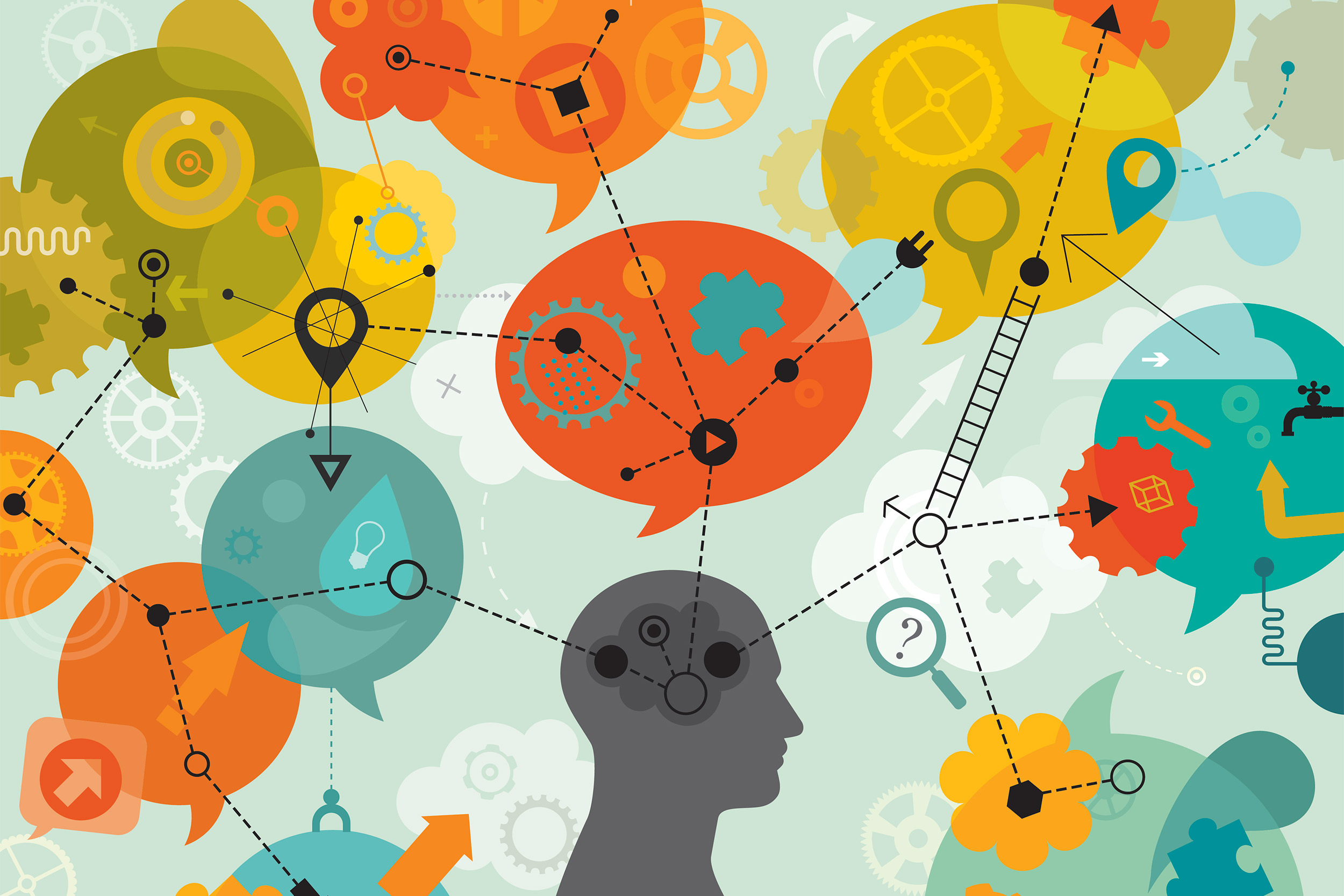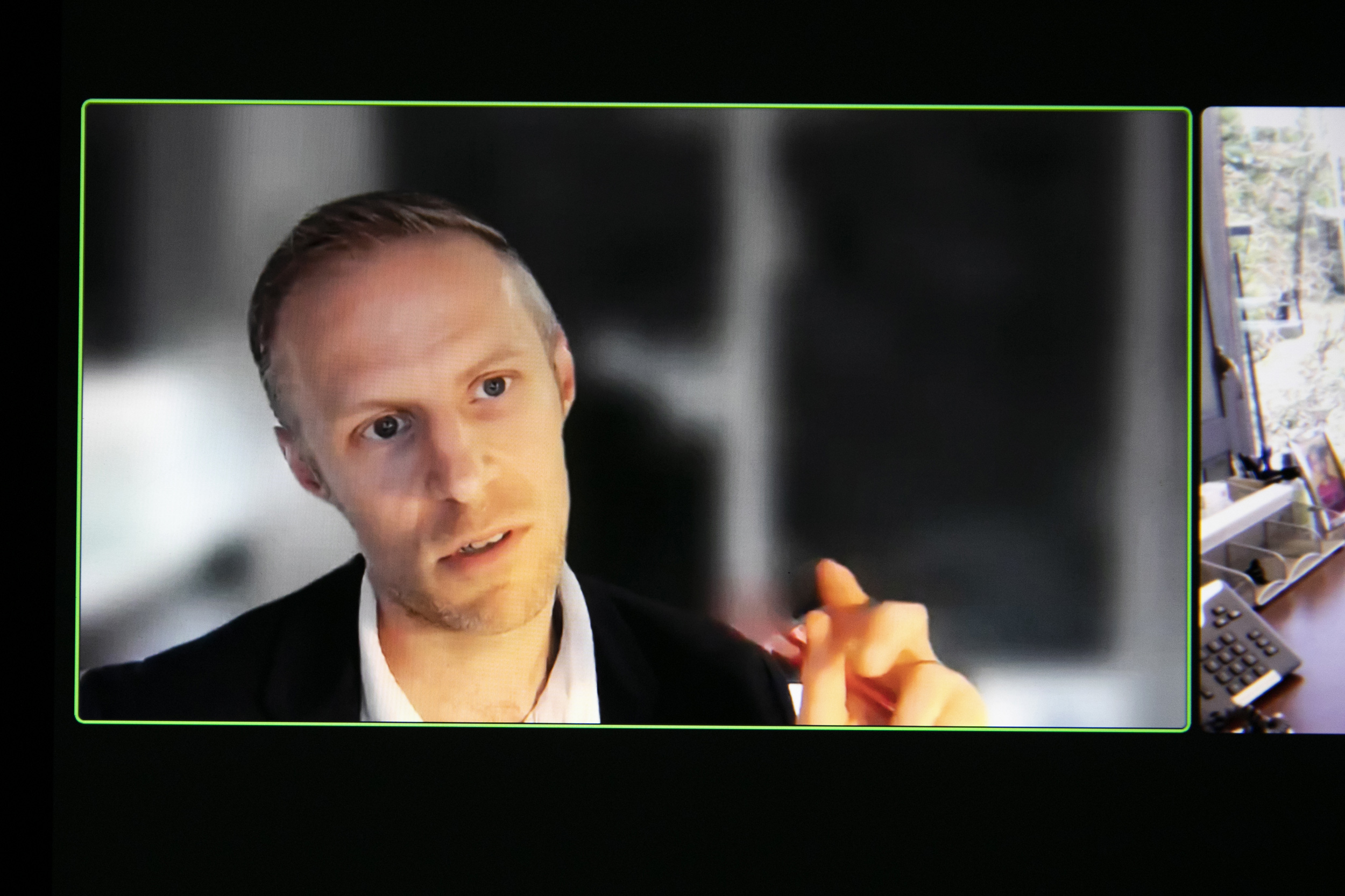
Within the barrage of information being taken in by the human brain, it is metacognition that helps determine which inputs to prioritize, explains Stephen Fleming, author of “Know Thyself: The Science of Self-Awareness”
iStock by Getty Images
It’s not easy being your brain
Exploring self-awareness with the scientist behind new book ‘Know Thyself’
“I think, therefore I am” has been a kind of human slogan ever since the 17th-century French philosopher René Descartes wrote his famous phrase. But scientists like Stephen Fleming might add another layer: “I think about thinking, therefore I am.”
“We often take this for granted,” Fleming, who studies metacognition, said last week during a virtual Harvard Science Book Talk presented by the University’s Division of Science, Cabot Science Library, and Harvard Book Store. Going for a walk, playing piano, or solving a math problem is a more visible form of thinking, he continued. But metacognition — self-awareness or thinking about thinking — is the invisible judge evaluating decisions such as what to eat for lunch, whom we want as a partner, and whether our convictions are right or wrong.
Speaking with Elizabeth Phelps, the Pershing Square Professor of Human Neuroscience, Fleming discussed his new book, “Know Thyself: The Science of Self-Awareness.” The conversation spanned the origins of metacognition, who excels at it (hint: kids do not), and how this field touches everything from ancient Greece to MRIs, dolphins to self-driving cars, anxiety to the origins of human consciousness.
Plato, Socrates, and other Greek philosophers believed self-awareness, or the ability to know one’s own mind, was the key to wisdom, said Fleming, principal investigator at the Wellcome Centre for Human Neuroimaging, University College London, where he leads the Metacognition Group. Centuries later, Descartes ran experiments to try to unravel this uniquely human capability. But it wasn’t until the last 50 years — and the invention of neuroimaging technology like MRIs — that scientists could finally start measuring what this murky, abstract process looks like in the human brain.
The human brain must grapple with a constant and chaotic barrage of sights, sounds, and smells. “It’s locked in this dark skull,” Fleming said. “It doesn’t have access to the outside world. It just has noisy sensory inputs.” Metacognition helps determine which inputs to prioritize and what, despite the onslaught, you still do not know. But even this higher-level thinking has gaps, to the benefit of ventriloquists and other illusionists. Because the human brain treats vision as more reliable than hearing, Fleming said, seeing a dummy talk is more convincing than hearing the performer’s mumbles.
Metacognition also helps humans predict and track actions, automatically tipping the body forward, for example, to compensate for an escalator’s initial jerk (if that escalator is broken, most people tip anyway and stumble, a meta-miscalculation).
“Metacognition promotes good decision-making,” says Stephen Fleming, during a virtual Harvard Science Book Talk.
Stephanie Mitchell/Harvard Staff Photographer

While low-level metacognition has been measured in infants just 6 months old, “kids below the age of 3 or 4 are notoriously bad at knowing whether they know the answer or not,” Fleming said. His 3-year-old son, Finn, for example, is quick to claim he knows all about something but, when pressed, admits that he doesn’t actually know. “Before that age, kids are more concrete,” Fleming said. “They think everyone sees the world the way they do.” But which comes first — the recognition of other minds or our own — is still a chicken-and-egg conundrum in the study of metacognition.
Even in “fully formed adults,” metacognition can differ from person to person and even culture to culture (a preliminary study performed by Fleming and colleagues in China found that collectivist societies, like China, have better metacognition than individualist ones, like Great Britain).
Yet, studies have found few differences across genders, except when it comes to confidence in one’s ability to perform a task, which, Fleming said, “becomes a self-fulfilling prophesy.” Confidence, whether merited or not, can boost performance. But high metacognition does not necessarily correspond with intelligence — you can be highly intelligent but unaware of how you’re performing on a specific task. In fact, studies have shown a correlation between anxiety or depression and high metacognition, perhaps because of an acute sensitivity to errors.
“Metacognition promotes good decision-making,” Fleming said. But for highly skilled athletes or musicians, this constant self-monitoring can get in the way.
“So, can you turn it off?” Phelps asked.
“That’s really hard to do voluntarily,” Fleming said. On the other hand, stress, injury, or disease can shut it down involuntarily — a potential complication for the legal system, which is founded on the idea of conscious intention.
Fleming also recently partnered with roboticists to study the overlap between metacognition and artificial intelligence. Machine learning might be a form of “thinking,” but robots tend to be overconfident when faced with a new situation, Fleming said.
“Obviously, you wouldn’t want your self-driving car to be overconfident,” he said.
Even if humans can no longer outthink today’s computers, they can still best them at thinking about thinking.





